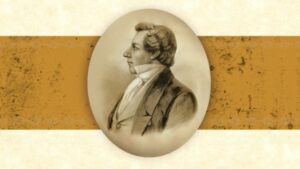
The scriptures speak of remarkable women of God who were devoted to His service. For example:
-Eve, who showed Adam the pathway into mortality, and who made possible our existence.
-Hannah, for whom the blessing of children eclipsed all other blessings.
-Elisabeth and Sarah, who trusted in God’s power long after most mortals would have given up in despair.
-Mary, who found favor with God and became the mother of the Son of God.
Throughout history, there have been many such women of God. One from our own dispensation was Emma Smith.
Doctrine and Covenants 25 is a revelation given to Emma Smith, but the message is intended for all women- as shown at the end of this passage of scripture where the Lord says, “This is my voice unto all” (D&C 25:16).
An Elect Lady
In this revelation, the Lord called Emma an “elect lady” (D&C 25:3), and suggested a number of qualities that she and others like her ought to have. Several of these directives are related to her companionship with her husband.
And the office of thy calling shall be for a comfort unto my servant, Joseph Smith, Jun., thy husband, in his afflictions, with consoling words, in the spirit of meekness. (D&C 25:5)
And thou shalt go with him at the time of his going. (D&C 25:6)
Let thy soul delight in thy husband, and the glory which shall come upon him. (D&C 25:14)
I have pondered Emma’s calling to be a comfort to her husband, and her assignment to delight in him, his glory, and his accomplishments. I don’t know why it should not be the other way around. But I do know that what was required of Emma, I have discovered in my wife. She has been a constant comfort to me through more than 45 years. She has rejoiced in my successes, even though, if the roles were reversed, she would clearly have done better than I.
Speaking of this inclination and divine obligation of women of God to follow a course different from the men of God, Elder James E. Faust, a leader in The Church of Jesus Christ of Latter-day Saints, said:
“Cultivate and employ your noble womanly instincts of care and mercy. Always hunger and thirst after righteousness. Great women respond generously to their instincts to do good. With your very being held still, listen to the whisperings of the Holy Spirit. Follow those noble, intuitive feelings planted deep within your soul by Deity. By responding thus to the Holy Spirit of God, you will be sanctified by truth and you will be eternally honored and loved. Much of your work as a woman is to enrich mankind. Care and mercy seem to be a dominant refrain of the song you have the opportunity to sing. I hope you will not leave any of the melody unsung” (Ensign, September 1986, p. 20).
When I ministered in a married student ward at Utah State University, our ecclesiastical unit included a trailer court. The mobility of people living there was a constant burden to the leadership of the ward. We rarely knew, from one week to the next, who would be living in any of the units. But the sisters always knew. The information we needed to minister appropriately to our ward members did not usually come from the men assigned to watch over them. It came each Sunday from the Relief Society president, who would give a report on who had moved, and where, and why. I have learned from these kinds of experiences that women are often superior in certain tasks than men are, but their divine assignment is to do something else.
The women of God, even in their excellence, and for reasons best known to the Lord, are not asked to do all the same things men are assigned to do. Among their many other duties, they are called to comfort their companions, and to delight in them, and to offer consoling words to them.
“Whither Thou Goest, I Will Go”
And to “go with [them] at the time of [their] going” (D&C 25:6). This instruction to Emma reminds me of the promise of Ruth to Naomi: “Whither thou goest, I will go; and where thou lodgest, I will lodge” (Ruth 1:16). My wife has said that to me, not with her words, but with her willingness.
We have lived in thirteen homes and apartments since our marriage in May of 1968. The first three locations we chose together because we were both in school and needed to be close to Utah State. After that, she went where I had to go. I was commissioned into the Army and she moved with me to Georgia, Arizona, and North Carolina. When I attended Brigham Young University, she came along to Provo, Utah. Then I got a job and moved to Tempe and Snowflake, Arizona. She remained by my side. She left behind the lovely home she had designed in Snowflake when we came to Orem, Utah. We did not come here because she loved the area, but because I wanted to go back to school. Three houses and 23 years later, we still live in Orem.
In each community where we have lived, we have made decisions about our actual residence together, but the communities have always been selected with my work in mind. I have needed to go and she has gone with me. “Whither thou goest, I will go” indeed!
I am amazed that she would do that for me. It seems to be part of the temperament of my wife and nearly all of the women of God to do what the Lord told Emma to do. It does not always seem fair, but it is compelling evidence of how good the women of God are.
“Greatness Is Not Measured By Coverage In Column Inches”
Elder Maxwell spoke of the difference in assignments for men and women.
“We know so little, brothers and sisters, about the reasons for the division of duties between womanhood and manhood as well as between motherhood and priesthood. These were divinely determined in another time and another place. We are accustomed to focusing on the men of God because theirs is the priesthood and leadership line. But paralleling that authority line is a stream of righteous influence reflecting the remarkable women of God who have existed in all ages and dispensations, including our own. Greatness is not measured by coverage in column inches, either in newspapers or in the scriptures.The story of the women of God, therefore, is, for now, an untold drama within a drama.
” (Ensign, May 1978).
The Duties of The Elect Women Of God
I made a list of all the things the Lord told Emma she ought to do in the revelation He gave to her–things that all elect ladies ought to try and do.
1. Be faithful (D&C 25:2)
2. “Walk in the paths of virtue before me . . .” (D&C 25:2). This reminds me of a quote from Brigham Young:
“Ladies, if we ask you to make your dresses a little shorter, do not be extravagant and cut them so short that we can see the tops of your stockings. Bring them down to the top of your shoes, and have them so that you can walk and clear the dust, and do not expose your persons. Have your dresses neat and comely, and conduct yourselves, in the strictest sense of the word, in chastity. If you do this you set a good example before the rising generation. Use good language, wear comely clothing and act in all things so that you can respect yourselves and respect each other. We wish you to remember and carry out these counsels.” (Journal of Discourses, Vol.12, p9.299-300, October 8th, 1868).
The idea of the prophet asking the ladies to shorten their skirts is sort of fun and most interesting, but the counsel of this admonition is eternal and powerful in its relationship to the need to walk in the paths of virtue.
3. “Murmur not because of the things which thou hast not seen . . .” (D&C 25:4). Emma was never permitted to see the plates her husband translated, even though several others were.
4. “And the office of thy calling shall be for a comfort unto my servant, Joseph Smith . . .” (D&C 25:5)
5. “And thou shalt go with him at the time of his going . ..” (D&C 25:6)
6. “Expound scriptures . . .” (D&C 25:7)
7. “Exhort the church . . .” (D&C 25:7)
8. “Thy time shall be given to writing, and to learning much.” (D&C 25:8)
9. “And thou needest not fear” (D&C 25:9). In D&C 24, a revelation also given in July of 1830 (when D&C 25 was given), we learn that Joseph had not yet planted his 13-acre farm in Harmony (see D&C 24:3). A farmer in northern Pennsylvania who is unable to plant a crop until July might find himself in difficulty during the possible frosts of October and the certain frosts of November, and without food in February. But the Lord told Emma not to fear. Her husband would support her.
10. “Thou shalt lay aside the things of this world, and seek for the things of a better.” (D&C 25:10)
11. “Lift up thy heart and rejoice . . .” (D&C 25:13)
12. “Cleave unto the covenants which thou hast made.” (D&C 25:13)
13. “Continue in the spirit of meekness . . .” (D&C 25:14)
14: “Beware of pride.” (D&C 25:14)
15. “Delight in thy husband . . .” (D&C 25:14)
16. “Keep my commandments continually . . .” (D&C 25:15)
“We each have the responsibility to love and help lead the rising generation. How will our young women learn to live as women of God unless they see what women of God look like, meaning what we wear, watch, and read; how we fill our time and our minds; how we face temptation and uncertainty; where we find true joy; and why modesty and femininity are hallmarks of righteous women? How will our young men learn to value women of God if we don’t show them the virtue of our virtues?” (Sherie E. Dew, Ensign, November 2001)
Cradles or Congresses?
One more marvelous comment from Elder Maxwell about women of God:
“When the real history of mankind is fully disclosed, will it feature the echoes of gunfire or the shaping sound of lullabies? The great armistices made by military men or the peacemaking of women in homes and in neighborhoods? Will what happened in cradles and kitchens prove to be more controlling than what happened in congresses? When the surf of the centuries has made the great pyramids so much sand, the everlasting family will still be standing, because it is a celestial institution, formed outside telestial time. The women of God know this” (Neal A. Maxwell, “The Women of God,” Ensign, May 1978, 11).
Guarding The Home: Society’s Most Noble Institution
As I was pondering the difference in assignments of men and women, I had a thought. J. Richard Clarke said that “the family is society’s strongest and most important institution” (Conference Report, April 1995). Since that is true, wouldn’t God want His finest warriors and most obedient servants assigned to stand guard there? Men guard the Church and help in the home, but women guard the home and help in the Church. Spencer W. Kimball said that mothers “have been placed here to help enrich, to protect, and to guard the home -which is society’s basic and most noble institution” (Ensign, November 1978, p. 103, emphasis added). He also said:
“How special it is for . . . women to be given the lofty assignments they have been given by our Father in Heaven, especially those of you who have been privileged to be born in this part of this last dispensation. Let other women pursue heedlessly what they perceive as their selfish interests. You can be a much needed force for love and truth and righteousness on this planet. Let others selfishly pursue false values, but God has given to you the tremendous tasks of nurturing families, friends, and neighbors” (Ensign, November 1979, p.104).


















Robin HollowithJuly 25, 2013
You have misread the scripture in D&C 25. Every where else in the scriptures where the Lord says that this is his voice unto all, he means all -- not all men if the scripture was written to a man, but all. D&C 25 is written to both men and women.
Diane Kunk elJuly 20, 2013
I appreciate you writing and publishing this article. Even though these views may not be "popular" in the world and even in the church, these are truths that need to be brought to our attention. Your quotes were especially excellent. Thank you.